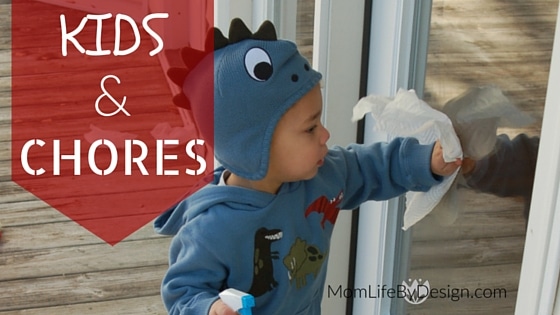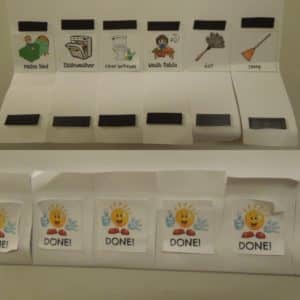
We have an unspoken rule in our house – if you live here, you help with things that need to be done. When everyone is making messes, it’s unfair for one person to be stuck cleaning up after everyone.
Just because our kids are little doesn’t mean they get a pass on being a helper. Granted, as they are learning, they often make a bigger mess instead of cleaning up one, but it’s an important learning process that I feel outweighs the few extra steps for me.
And truthfully? They LOVE to help. They are consistently asking me if they can help with anything I’m doing, and I would much rather channel that energy into something (semi) productive!
It also helps that I’ve learned to just let go of whatever job they are “helping” with, and allow however they do it to be good enough until next time. Here’s a deeper look at the why and how we do this in our home if you’re ready to try something different.
Why We Do Chores
My oldest, after watching an episode of Arthur on PBS, decided rather quickly that he would like to have a butler. (Thanks, Arthur. Wouldn’t we all?!) He told us he wanted someone to take his trash, bring him things, and buy him toys. Even though he didn’t grasp the concept perfectly, the root of his desire was the same – selfishness.
Granted, this was an innocent (and quite hilarious, but I managed to stifle the giggles) request to mimic what he saw on TV, but this attitude left unchecked, can wreak havoc on us all. I don’t want my kids (or myself!) growing up feeling entitled, above doing work, or only out for their personal gain.
My little ones would tell you that the reason we all help with things that need to be done around the house is because “We are a family, and family helps each other.” This is the simplest, yet most profound explanation as to why we feel everyone helping with chores is important.
We want our home to be a place where they safely learn how to love God and deal with the rest of the world. When we all pitch in to get things done, it provides valuable lessons in collaboration, humility, kindness, and working hard with a cheerful heart.
Do You Pay for Chores?
There is much debate in the parenting world over the exchange of money for chores, and I can identify with points on each side.
While we do give an allowance to our children, this isn’t tied to doing chores at all. For us, their allowance is a simple tool to help them learn financial responsibility at an age appropriate level. We felt at this point, for our family, tying the two together would undercut some of the other character lessons we are fostering through simply doing chores together without expecting anything in return.
Getting Started With Age Appropriate Chores
It’s important to keep in mind the age and skill level of your children when asking them to help with things around the house. The last thing you want to do is frustrate them from helping by giving them something they aren’t able to complete, or saddling them with the task that NO ONE wants to do. There’s a delicate balance here.
I found this chart super helpful in thinking through some ways my kids could help around the house. While it is divided by ages, it will be helpful to think through this chart with your children’s specific skills, strengths, and weaknesses to better match them with ways they can help.
While my youngest falls in the right age to empty the dishwasher, his nickname is “Wreck-it Ralph.” Considering him personally, handling fragile objects is probably not the best choice if we want us both to be frustration free.
 (From Sports Mom Survival Guide)
(From Sports Mom Survival Guide)
Charts and Ideas to Keep Track of Chores
Once you’ve thought through the best chores for your kids, the next step would be to teach them what is expected and establish a pattern of everyone helping around the house. After this groundwork, introducing chore charts is the next logical step. I tried introducing chore charts right off the bat and found that we just weren’t consistent because the pattern wasn’t established first. We have to lay the foundation, and then we can build on it.
My kids each have 5 chores to help around the house each day, in addition to taking their plates to the sink after mealtimes and cleaning up their toys as they finish playing with them. I made a magnetic flip chart that lives inside the pantry door that allows them to “close” the task as they complete it. They love being able to flip them shut.

The magnetic chart is what works best for us, but there are tons of options for chore charts. I wanted to keep things simple and effective for my boys. Any method that works for your family is a winner in my book!
